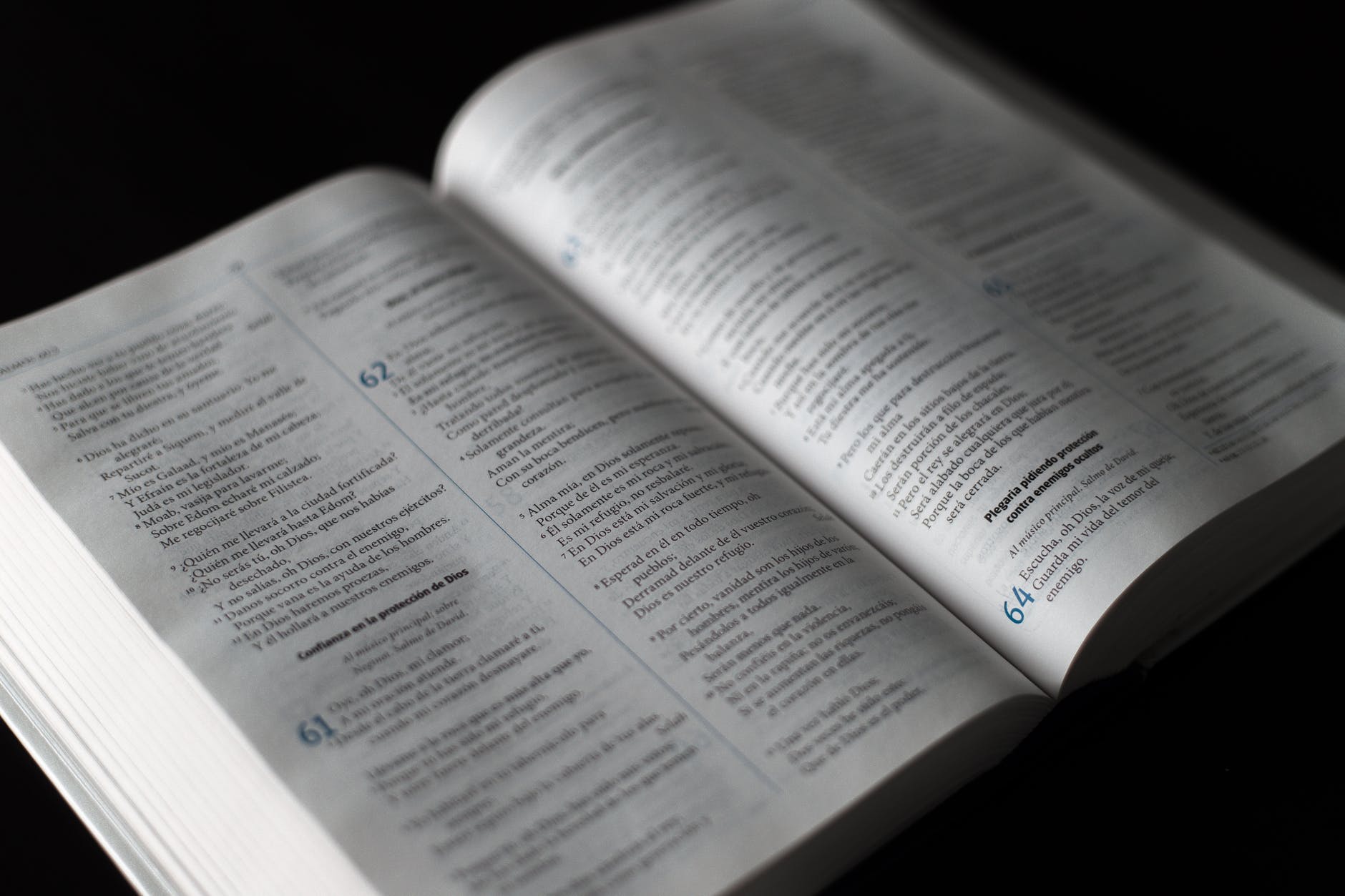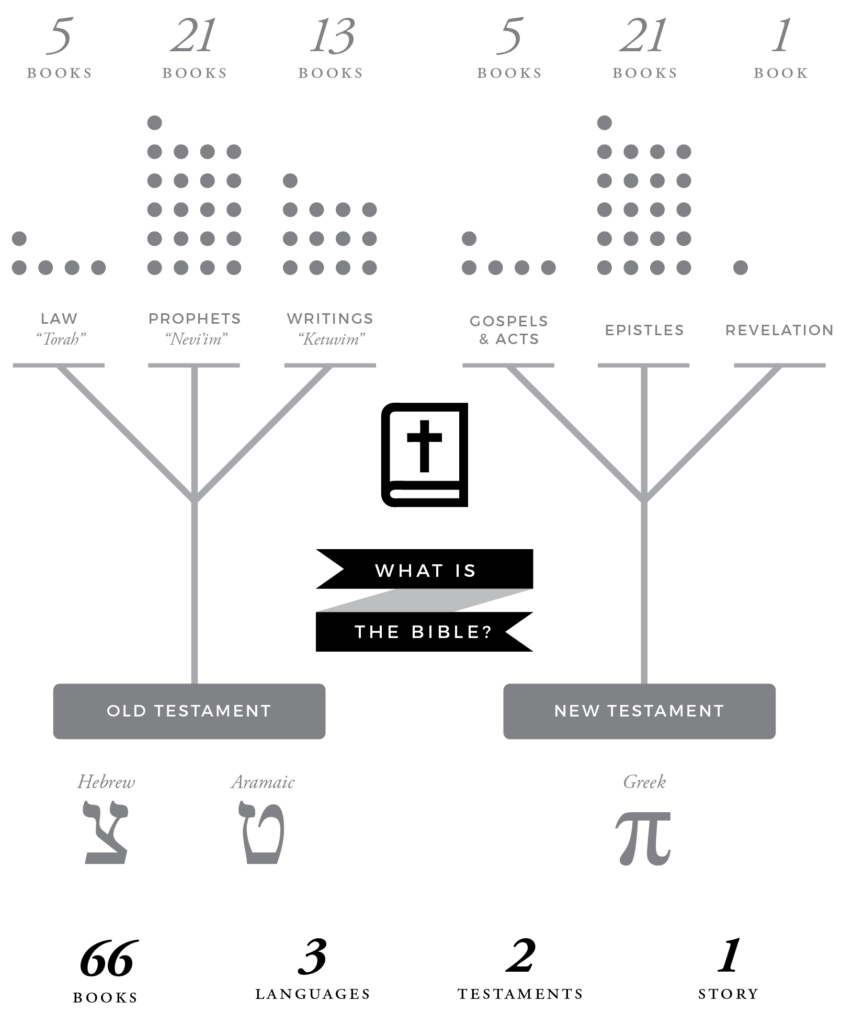Deep discipleship starts with learning how to read the Bible for yourself.
Our #1 Struggle with the Bible →

What Is The Bible?
The Old Testament
The Jewish sacred book is called the Tanakh (or the Miqra). Written mostly in Hebrew with a bit of Aramaic, the Tanakh consists of thirty-nine books that you and I call the Old Testament:
- Torah (5 books) aka ‘The Law’
- Nevi’im (21 books) aka ‘The Prophets’
- Ketuvim (13 books) aka ‘The Writings’.
The New Testament
Jesus was a rabbi (Jewish teacher) from Nazareth – a small and poor town in Palestine. He called twelve men to be his devoted students and used the Tanakh to teach them how to follow God.
During the first century, Christianity spread like wildfire and soon, Jews and non-Jews were starting to worship Jesus. What’s another word for assembly? Church.
Some of the twelve began to write to their various churches to encourage them, correct any wayward beliefs or give them a telling off for unhelpful behaviour. They produced two types of documents: epistles and gospels.
- Epistles are letters written to specific churches or groups of people (e.g. Corinthians, Galatians)
- Gospels are accounts about the life, death and resurrection of Jesus (Matthew, Mark, Luke & John)
The new churches viewed these documents as their highest authority since they were written by Jesus’ closest friends. These are the twenty-seven books we call the ‘New Testament’.
The Canon aka The Bible
These Christians also loved the Tanakh since it pointed to Jesus. Therefore, it was necessary to compile all these writings into one book. After several meetings over hundreds of years, the church published the official list of books that all Christians called ‘holy’ at the start of the 5th century. They called it the ‘canon’. We call it the Bible. It includes:
- Thirty-nine Jewish books from the Tanakh.
- Four Gospels: Levi (aka Matthew), Mark, Luke & John
- Acts also from Luke.
- Three epistles and a vision from John.
- Thirteen epistles from Paul.
- Two epistles from Peter.
- One epistle from Jesus’ brother James.
- One epistle from Jesus’ brother Jude.
Who is the central figure of all these writings? God. Every word of the Bible is written to lead you to the feet of the one who put stars in space and hair on your head. He is the creator, sustainer, merciful, wrathful, almighty, sovereign and the main character of our divine drama.
Sixty-six books.
Three languages.
Two Testaments.
One story.

Why is reading the Bible hard?
We love the Bible and believe it to be the inspired Word of God, but don’t take the time to study it. Then, bursting with inspiration on the way back from a conference, we decide to have another go. We crack it open and the language does not make sense, the books are in a weird order and our brains are overwhelmed with the genealogies, commands, prophets and weird talking donkeys. By day five, we’re back to mornings with Hillsong and the verse of the day…again.
What’s the result?
Well, we start to believe things that are contrary to the story of the Bible – like the other forty-eight percent in Barna’s survey that believe it condones pornography. This is biblical illiteracy.
So, what’s the solution to our Bible illiteracy problem? We need to change our perspective of the Bible and start to devour it like Ben and Jerry’s Fish Food on a warm summer afternoon. The problem with our relationship to the Bible is that we do not understand what it is, how to read it and what difference it should make in our lives. In essence, we don’t know the what, the how or the why.
SOAP: Ten Tips to Read the Bible
Hermeneutics, the four-syllable terror-of-a-word simply means ‘the art of interpreting the Bible’. If you’re going to abide in the Word, it’s essential to learn hermeneutics. Easy, right? Although it’s a fancy word, hermeneutics is better explained by the acronym SOAP: Scripture, Observation, Application and Prayer.
Scripture
One: Make a Plan
What are you going to read? If you’re a beginner, start with the gospels and fall in love with Jesus. From there move on to the foundations of the early church in Acts. As the gospel spread around the Middle East, the Apostles planted churches as thousands became Christians.
These churches had problems. The Corinthians loved sex and getting drunk in church. The Galatians preferred religion to the Gospel and the Thessalonians were getting upset because their members kept getting killed. After Acts, most of the New Testament is letters written to these new churches.
Two: Decide Where & Decide When
Set aside regular time to intentionally study God’s Word. Start with an small and simple plan: two minutes to begin. Remember, this is eating and drinking, not training for a marathon: one you do all the time; the other you do for a season.
Three: Fight to find God
The primary way God speaks to us is through the Bible. Therefore, fight for a method that lets you engage with Scripture consistently. God has so much he wants to say to you, a pile of sin he wants to break in you and an infinite Spirit that he wants to forge in you. If your attitude to the Bible is ambivalent or blasé, you need to understand that you are cutting off the most vital line of communication with your creator. It’s time to do something about that.
Observation
To understand your Bible, you need to put yourself into the story. This is observation. Here are three tips to help you get started:
Four: Read Slowly
Do not read the Bible as if it were a tick list. Read slowly, thoughtfully and thoroughly. If you’re reading and nothing is going in, slow down. Cherish every word, dig down deep for all the treasures of glory that God has placed for you to find. The book of Titus is three chapters long. I was in the book of Matthew for a year and loved it. There’s no shame in taking your time.
Five: Know the Context
Every verse is part of a chapter, which is part of a book, which all fits into an overall story. For example, without context, when Jesus instructs people to drink his blood and eat his flesh (John 6:56), the application is rather awkward.
With context, you see that Jesus was explaining to his Jewish brothers that he was the true Passover Lamb of God who was to be sacrificed so that their sin may be forgiven. A good way to start understanding the context is to read an entire chapter at a time.
Text without Context is a Con.
Jarrod Saul McKenna
Six: Don’t forget the Big Picture
In Harry Potter, every book, character, side quest, relationship and conflict is part of that over-arching story: Harry is the chosen wizard to rid the world of the evil Lord Voldemort.
The same is true of the Bible: ‘For God so loved the world that he gave his one and only Son, that whoever believes in him shall not perish but have eternal life’ (John 3:16).
The Old Testament points to Jesus and the New Testament is birthed from the life, death and resurrection of Jesus. There’s one story, from which all other stories are born.
Application
The following three tips will help you begin to apply the Word to your own life.
Seven: Get to know God
The Bible is about God and his acts in human history. It’s the closest you’ll get on this side of eternity to sitting at his feet. It reveals to you who God is and who God isn’t. What pleases and angers God, as well as what excites and depresses him. The Bible lets you sit as close as you can to the maker of the rings of Saturn and so drink in as much of him as you can. Academics call this theology: the study of God. You should think of it as getting to know your heavenly Father.
Eight: Let God Change You
This is not information, this is transformation. The Same Spirit that rose Jesus from the dead, inspired the Apostles to write scripture. Therefore, as you get close to God through encountering him in his Word, His Spirit will start to change you. Think of the Bible as the chisel and the Holy Spirit as the sculptor. The more you read the Word and let it change you, the more permission you give him to chip away at the sin in your life, chiselling away at you until you are a perfect sculpture.
Example: The Bible says that you are ‘fearfully and wonderfully made’ (Psalm 139:14).
Let that seep in. Regardless of how you came into this world, God made you. God thought about you long before your parents ever did. Be encouraged; you are the walking handiwork of God Almighty.
However, the Bible also says, ‘There is no one who seeks God. All have turned away’ (Romans 3:12). That also refers to you. While we were each made by God, most of us pay him no attention, give him no glory and live as if he doesn’t exist.
Without Jesus, you are a sinner who will one day live in an eternity without God (just as you lived on earth). Do you see how the Bible is both encouraging and challenging?
Nine: Fulfil Your Mission.
God doesn’t only want to change your world; he wants to change the world through you. Jesus left us with one mission: make disciples locally, nationally and internationally (Matthew 28:18–20). As you read your Bible, the Holy Spirit will begin to encourage and inspire you to fulfill the mission he has for you.
Prayer
The last tip is simple: pray.
Pray for discipline to make a plan.
Pray whenever you see God show up. Pray when he seems absent.
Pray when you can’t be bothered, as well as when you feel passionate about it.
Pray when it makes sense. Pray when it doesn’t.
Pray for the strength to make it a habit.
Pray God breaks your heart.
Pray he chisels away at your soul.
Pray you don’t abuse the text.
Pray you learn to love the Bible but, more importantly, pray you learn to love the God behind it.
What is the Goal?
The point is this: as you read your Bible, the Holy Spirit will begin to encourage and inspire you. Who knows what adventures God wants to take you on as the Word prepares you for the world?
As you begin to read the Bible, the depths you’ll discover about yourself, the brokenness of the world and the magnificence of God himself will be worth every early morning, every half-hearted heartfelt prayer and decision to forgo sleep or Netflix to open your Bible.
You’ll need God at the start, as you simply won’t be able to do it without him. But I promise, you’ll see God at the end and God will carry you in the middle.
IF YOU WANT MORE







